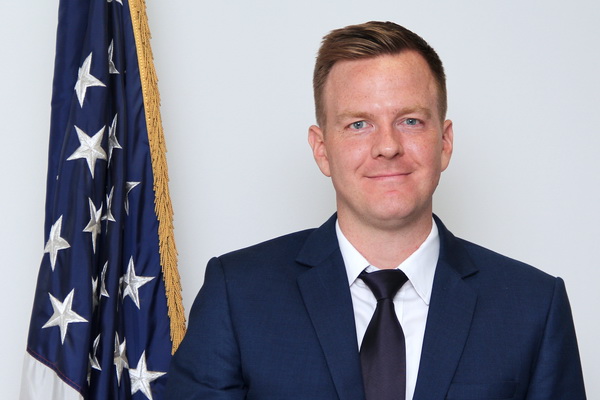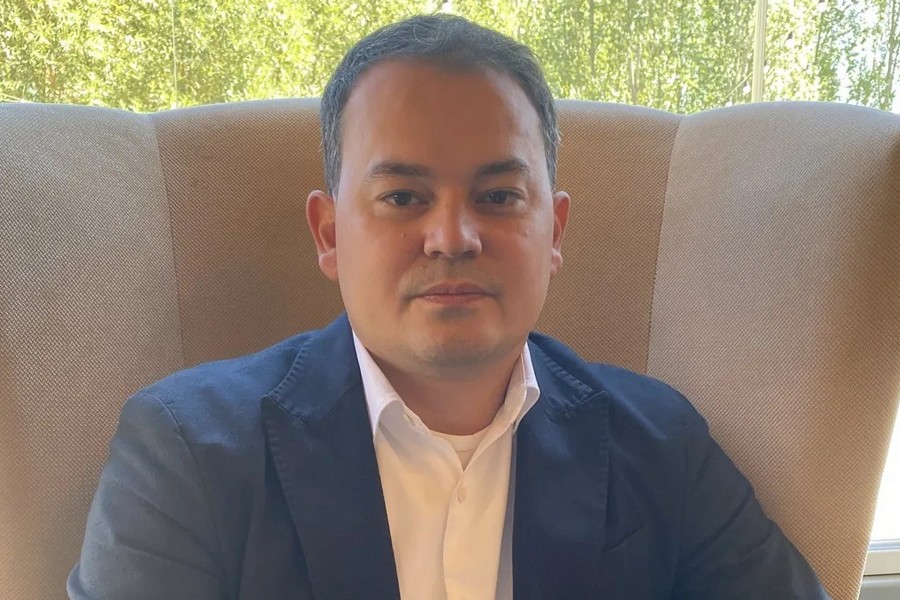US Department of State Official Representative Charles MARTIN:
"Kazakhstan wants to become a bridge between Europe and China, and we support this initiative"

Secretary of State of the United States John Kerry visited five Central Asian countries from October 30 to November 3. Charles MARTIN, an official representative of the US Department of State, told Interfax-Kazakhstan in an interview what priority the US gives to the relationship with the countries of Central Asia and how Kazakhstan could help fight ISIL.
- The US Secretary of State John Kerry discussed with the leadership of Kazakhstan the problems of Afghanistan during his visit to Astana. Did the sides reach any agreement?
- Thank you for this opportunity to give you an interview. Of course, the problem of security in Afghanistan is very pressing, and it was discussed during a meeting with the foreign ministers of the five Central Asian countries. As you may know, President Obama announced recently that the US will keep 5,500 troops in Afghanistan beyond 2016. After the meeting, the ministers issued a joint declaration stressing the importance to support the Afghan government and to work together to protect the security interests of the Central Asian countries. Therefore, we will continue to cooperate with our Central Asian partners in this area. We are already carrying out a number of security programs. We support border protection services in Central Asia, including Kazakhstan. We believe that it is important to maintain stability in Afghanistan. It is not only the matter of security but also economic development. Therefore, we believe it is very important to work with our partners in Central Asia on economic development and to help establish relations between Afghanistan and the region. We have a number of transport projects with the Central Asian countries and it was announced at the meeting of foreign ministers in Uzbekistan that we need to work in closer cooperation in order to implement these transport infrastructure projects.
- As a result of the Fourth U.S.-Kazakhstan Strategic Partnership Dialogue the sides announced their intent to deepen cooperation in countering the threats of ISIL, terrorism, and violent extremism. How will this cooperation look like?
- During his visit to Astana, the Secretary of State commended Kazakhstan for recently holding a Summit on Countering Violent Extremism. We will continue to support Kazakhstan’s effort to counter violent extremism. We also work closely with our partners in Kyrgyzstan and Uzbekistan in this area. I would like to reiterate that we have been cooperating with the border protection services of the Central Asian states because everyone understands that ISIL is a threat to all of us. That is why we believe that it is important to provide economic opportunities for the young generation. Half the population in the region is under the age of 30. The Central Asian countries should work together to develop their economies in order to be able to provide opportunities for this generation.
- What specifically does the United States expect Kazakhstan to do in connection with the ISIL threat?
- Kazakhstan is already fighting against violent extremism. We are working towards economic development of Kazakhstan, bringing US investment here. The best way to counter extremism is to create jobs for young people in the region.
- You mentioned the meeting of foreign ministers of the Central Asian countries and the US Secretary of State John Kerry in Samarkand on November 1. What was the reason behind this initiative? How often will the “C5+1” meetings be held?
- The first such meeting was held recently in New York during the UN General Assembly, which demonstrates the importance of this region for the global community from the security viewpoint. We have cooperated with our partners in Central Asia for many years but this was the first time when a US Secretary of State and all foreign ministers of the Central Asian countries gathered at one place to discuss the most pressing issues. We plan such meetings to be regular in order to be able to discuss issues relating to economic development, security and environment protection. I would like to add that this does not run contrary to the current relations between the Central Asian states and other countries. This is our policy that the Central Asian states should be able to maintain good relations with the other countries, including China, Russia, and the European Union countries. We are pleased to be one of the partners to our friends in Central Asia.
- When visiting the Central Asian states John Kerry repeatedly said that the United States wanted the countries in the region not only to strengthen the relations with the United States but also with each other. What specifically does the United States intend to do to strengthen the regional relations?
- This is a very good question, for we have long believed that Kazakhstan and the other Central Asian states will develop more effectively if they have deeper economic relations not only with each other but also with the other regions. That is why, we support the New Silk Road Program [initiated by the US Department of State and aimed at integration of the Central Asian countries and Afghanistan], which is consistent with the Nurly Zhol Program initiated by your President. We are already investing capital in this Program through the projects financed by the World Bank and Asian Development Bank. These international institutions finance projects for construction of highways from China through Almaty, Taraz, Shymkent and Kyzylorda to Russia and Europe. Kazakhstan wants to become a bridge between Europe and China, and we support this initiative. It is also important that the Central Asian states should increase trade with each other, and we have a number of projects that will help achieve this aim. The Asian Development Bank finances programs that will link the transport routes of Kazakhstan and the other countries of Central Asia. The idea is the following: if these countries can trade with each other and with the South Asia, this will provide more opportunities for the exporters in Central Asia and will also help the development of Afghanistan, as these routes go through Afghanistan. This would benefit the whole global community. The purpose of these transport routes is not to bypass Russia or China. We believe that the more trade opportunities, the better.
- Let us talk about economic cooperation. Kazakhstan will become a full member of the WTO by the end of the year. Do you expect any increase in the US investment in Kazakhstan in this connection? Do you think the sales turnover between our two countries may also grow?
- We are proud to be the largest investor in Kazakhstan. Therefore, Kazakhstan's accession to the WTO will lead to an increase in the trade turnover between our countries. The Secretary of State visited a locomotive builder in Astana. This is a US-Kazakhstan joint project. We would like to see more joint projects between our companies.
- John Kerry said, when delivering his lecture at the Nazarbayev University, that the US wants to deepen economic cooperation with the countries of the region. In what other sectors, except engineering and energy, does the US plan to enhance cooperation with Kazakhstan?
- The Secretary of State talked a lot not only about the development of economic relations but also about the development of relations in the sphere of education. Today, thousands of students from Kazakhstan and the other Central Asian states study in the United States. During the years of independence, more than 25 thousand students from Central Asian countries have graduated from the US universities, and we want this figure to increase further. We are ready to expand the number of participants in professional development and exchange programs involving Kazakhstan and the Central Asian region. We also want to increase the number of scientists participating in exchange programs, including both Kazakh scientists coming to the United States and American scientists coming to Central Asia.
As I already mentioned earlier, one of the top priorities of the US policy in the region is to help create new jobs for young people. We plan to expand our programs and the number of participants in these programs. Every year, Almaty hosts a Central Asian Trade Forum. Businessmen from the Central Asian and South Asian countries come to Kazakhstan. Last year, the forum was attended by nearly a thousand people, next year we expect the number of participants to double. This is just an example of how we plan to bring people together in order to create new enterprises, to establish new economic relations between the Central Asian states and other regions.
- US Ambassador to Kazakhstan George Krol said earlier that the US might extend tourist visas for Kazakh citizens to ten from five years. Is there any progress here?
- Yes, and we hope that, working together with our Kazakh partners, we will be able to extend visas to ten years. The five-year visa regime has already allowed many Kazakh citizens to visit the United States and many US citizens to visit Kazakhstan. We want to work with Kazakhstan on this issue, because Kazakh citizens are good students, good tourists, and good guests, and we want to see more Kazakh citizens in the United States and, in turn, more Americans in Kazakhstan.
- Is there any fixed date when this will happen?
- Unfortunately, not, but we will make an announcement as soon as it becomes possible. We are now working on this issue.
- Thanks for your time!
November, 2015
© 2025 Interfax-Kazakhstan news agency
Copying and use of these materials without reference to the source is prohibited
Archive





